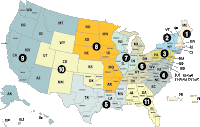In Arsali v. Deutsche Bank National Trust Company, et al (4D10-3830), the Fourth District reversed a trial court's order cancelling a foreclosure sale "because the trial court erred in summarily granting the bank’s motion to rescind the foreclosure sale without notice to appellant and without an evidentiary hearing on the bank’s allegations that the bid was grossly inadequate and resulted from mistake, fraud, or other irregularity in the sale."
After a judgment was entered, the trial court scheduled a foreclosure sale. Approximately fifteen days prior to the foreclosure sale, counsel for the lender/appellee "filed a Motion to Cancel the Foreclosure Sale to determine whether the homeowner qualified for a loan modification. The trial court, however, failed to enter an order cancelling the foreclosure sale, and the sale went forward as scheduled..." After the foreclosure sale:
The bank promptly filed an Emergency Motion to Rescind and Reschedule the Foreclosure Sale, asserting that '[d]ue to its mistake or inadvertence, and because [the bank] believed the sale would be cancelled, [the bank] failed to send a representative to the foreclosure sale.' The bank further alleged that the property was appraised at $185,940.00, and that a third-party purchaser’s bid of $16,100.00 was “grossly undervalued at 11.55% of the property’s appraised value.” Along with the bank’s emergency motion, the homeowner filed an objection to the foreclosure sale; the homeowner mistakenly believed that the foreclosure sale had been cancelled and argued that granting the objection would not prejudice anyone since title to the subject property had not been transferred.
The trial court granted the emergency motion to cancel sale at a motion calendar hearing, however, the appellant was not given notice of the hearing.
The Fourth District first addressed an argument made by the appellee that the appellant did not have standing to bring the appeal. The court stated:
The bank contends that because appellant did not obtain a court order permitting him to intervene in this foreclosure suit prior to filing this appeal, he now lacks standing to be a party in this action. Appellant responds that such procedure is unnecessary, as Florida’s well-settled law recognizes that a third-party purchaser who is not a named party in the action becomes a quasi-party with standing to appeal an adverse ruling. Appellant argues that as a third-party purchaser, he is a quasi-party who does not need to intervene under Rule 1.230 in order to have standing to appeal. We agree.
After addressing the standing issue, the court discussed the merits of the appeal.
As to the merits, “[w]hether the complaining party has made the showing necessary to set aside a [foreclosure] sale is a discretionary decision by the trial court, which may be reversed only when the court has grossly abused its discretion.”....“It is well established that courts may exercise their discretion as courts of equity to set aside foreclosure sales and allow mortgagors to exercise their statutory right of redemption where there has been some defect in the proceedings regarding notice of the foreclosure sale date, or other egregious matters, such as a grossly low bid by the purchaser and accident or mistake on the part of the mortgagor or an attorney representing the mortgagor, in failing to attend the foreclosure sale.”
***
For a trial court to properly rescind a foreclosure sale, the record must demonstrate that the sale was improper based upon a two-part test. The mortgagor has the burden of proving not only that “the foreclosure sale bid was grossly or startlingly inadequate,” but also that the bid’s inadequacy resulted from “some mistake, fraud or other irregularity in the sale.”....In determining whether a foreclosure sale should be vacated, a trial court may conduct an evidentiary hearing on the bank’s motion to rescind the sale....A trial court conducts an evidentiary hearing because attorneys’ arguments are not evidence....Moreover, unsworn statements by an attorney at a hearing do not establish facts upon which the trial court can rely.
Finally, the court concluded:
Here, it appears the trial court summarily granted the bank’s motion to rescind the foreclosure sale without holding an evidentiary hearing to determine a factual basis for the bank’s claims. As noted earlier, the bank’s motion did not attach sworn affidavits, and the bank did not present testimony at the calendar call. The record does not reflect that the bank presented witnesses who vouched for the bank’s mistake or testified to the gross inadequacy of the price. We thus conclude that the trial court abused its discretion in summarily granting the motion without holding an evidentiary hearing to determine whether the sale should have been set aside.



0 comments:
Post a Comment